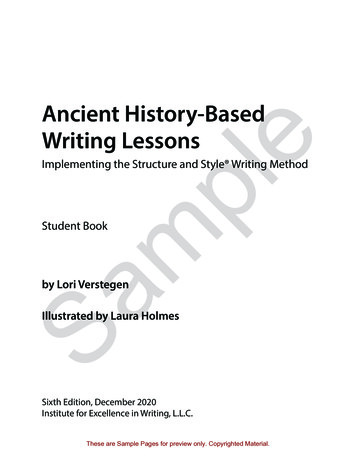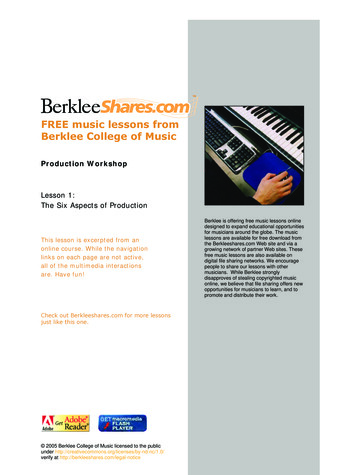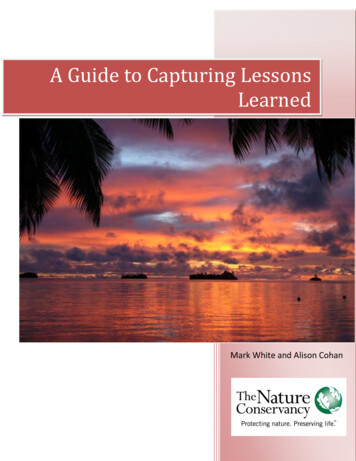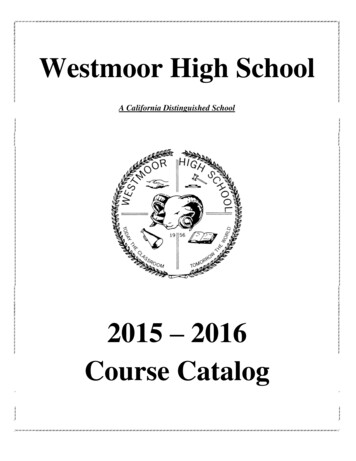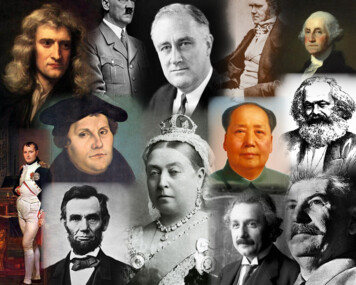
Transcription
The Lessons of Historyby Will and Ariel DurantSimon and Schuster, 1968Purpose of BookThe Lessons of History evolved out of a second reading of The Story of Civilization,Will and Ariel Durants’ renowned ten volume historical account of history fromearliest civilization to the Age of Napoleon. From this second reading, the Durants"made note of events and comments that might illuminate present affairs, futureprobabilities, the nature of man, and the conduct of states.”The Durants needed only 102 pages to accomplish their objective.Hesitations About Their PursuitThe Durants ponder the following questions about their life-long studies:1. What is the utility of our studies?2. Has our work been a mere recounting of the rise and fall of nations and ideas?3. Have we learned more about human nature than the average, unread man?4. Has history provided any illumination of our present condition?5. Has history provided any guidance for our judgments and policies?6. Is there any guard against the rebuffs of surprise or the vicissitudes of change?7. Have you found such regularities in the sequence of past events that you canpredict the future actions of mankind or the fate of states?8. Is it possible that history teaches us nothing?To these questions the authors admit that: “a multitude of doubts assail our enterprise”. “that our knowledge of any past event is always incomplete, probablyinaccurate, beclouded by ambivalent evidence and biased historians,and perhaps distorted by our own patriotic and religious partisanship.”“Even the historian who thinks to rise above partiality for his country,race, creed or class betrays his secret predilection in his choice ofmaterials, and in the nuances of his adjectives.” The authors do not answer these questions here.Page 1 of 23
History and the Earth History reveals that man is always trying to overcome the obstaclesimposed by geological and climatic forces: when man builds a city, atornado destroys it; when confronted with intolerable heat, mancounters with air conditioning; when faced with a desert, man attemptsto irrigate it.Figure 1: 1923 Earthquake Kills 300,000Japanese, Wounds 500,000 “The influence ofgeographic factorsdiminishes astechnology grows.” “When sea power finallygives place to air powerin transport and war, weshall have seen one ofthe basic revolutions inhistory.” Air transport provides a more direct route between source anddestination than sea transport. As always, such a transformation willproduce winners and losers. Countries with massive land area, such asRussia, China, and Brazil, should benefit greatly. Countries relying onincome-producing sea transportation, such as England, will experiencean abatement in this industry. “Man, not earth, makes civilization.”
Biology and HistoryBiological lesson #1: life is competition. Churches compete, cities and states compete, countries compete, ethnicgroups compete and, in the process, different alliances evolve.Biological lesson #2: life is selection. The authors issue a sober reminder that nature cares very little for man’sdeclaration of independence: “we are all born unfree and unequalsubject to our physical and psychological heredity, and to the customsand traditions of our group; diversely endowed in health and strength, inmental capacity and qualities of character.” “Inequality is not onlynatural and inborn, it grows with the complexity of civilization.Hereditary inequalities breed social and artificial inequalities: everyinvention or discovery is made or seized by the exceptional individual,and makes the strong stronger, the weak relatively weaker ” “.freedom and equality are sworn and everlasting enemies,and when one prevails the other dies. Leave men free, andtheir natural inequalities will multiply almost geometrically,as in England and America in the nineteenth century underlaissez-faire. To check the growth of inequality, libertymust be sacrificed, as in Russia after 1917. Even whenrepressed, inequality grows; only the man who is below theaverage in economic ability desires equality; those who areconscious of superior ability desire freedom; and in the end superiorability has its way.” “A society in which all potential abilities areallowed to develop and function will have a survival advantage in thecompetition of groups. This competition becomes more severe as thedestruction of distance intensifies the confrontation of states.”Biological lesson #3: Quantity is a prerequisite to the selection of quality Nature cares not that a high birth rate has usually accompanied aculturally low civilization, and a low birth rate a culturally highcivilization. The authors issue a stern reminder that nature “is moreinterested in the species than the individual.”
The authors recount the predictions of Malthus, who wrote that thenumber of mouths should not exceed the ability to feed them but theyadd that the technological advances of agriculture and contraceptionappear to refute Malthus. Nonetheless, the authors conclude: “ideallyparentage should be a privilege of health, not a by-product of sexualagitation.” Economic and political power can be gained through an abundanceof breeding. “In the United States the lower birth rate of the AngloSaxon has lessened their economic and political power; and the higherbirth rate of Roman Catholic families suggests that by the year 2000 theRoman Catholic Church will be the dominant force in national as wellas in municipal or state governments.” “So the birth rate, like war, maydetermine the fate of theologies; just as the defeat of the Moslems atTours (732) kept France and Spain from replacing the Bible with theKoran, so the superior organization, discipline, morality, fidelity, andfertility of Catholics may cancel the Protestant Reformation and theFrench Enlightenment.”Race and History The rise, success, and fall of a civilization depend upon the inherentquality of the race. “The degeneration of a civilization is what the word itself indicates—afalling away from the genus, stock, or race.” “Usually this comesthrough intermarriage of the vigorous race with those whom it hasconquered. Hence, the superiority of the whites in the United States andCanada (who did not intermarry with the Indians) to the whites in LatinAmerica (who did).” Only those who are themselvesthe product of such enfeeblingmixtures talk of the equality ofraces, or think that “all men arebrothers.”
“All strong characters and people are race conscious, and areinstinctively averse to marriage outside their own racial group.” Weaknesses in race theory become obvious when scholars of each raceremind us of their civilization’s contributions. The author also cites that the ancient cultures of Egypt, Greece, andRome were evidently the product of geographical opportunity andeconomic and political development rather than of racial constitution. “.from Western Europe came the civilization of North and SouthAmerica. In the third and following centuries of our era various Celtic,Teutonic, or Asiatic tribes laid Italy waste and destroyed the classiccultures. The South creates the civilizations, the North conquers them,ruins them, borrows from them, spreads them: this is one summary ofhistory.” “Attempts to relate civilization to race by measuring the relation ofbrain to face or weight have shed little light on the problem.” “If the Negroes of Africa have produced no great civilization it isprobably because climatic and geographical conditions frustrated them;would any of the white “races” have done better in those environments?It is remarkable how many American Negroes have risen to high placesin the profession, arts, and letters in the last one hundred years despite athousand social circles.” “It is not the race that makes the civilization, it is the civilization thatmakes the people: circumstances geographical, economic, and politicalcreate a culture, and the culture creates a human type.” “An Americandoes not make his race, his race makes him.” “Racial antipathies have some roots in ethic origin, but they are alsogenerated, perhaps predominately, by differences of acquired culture--oflanguage, dress, habits, morals, or religion.”
Character and History Our most basic tendencies are instincts. Human beings are normally equipped by “nature” (heredity)with six positive and six negative instincts, each functions topreserve the individual, the group, or the species. Each instinctgenerates habits and is accompanied by teryAcquisition Avoidance EatingHoardingPropertyAssociation PrivacyCommunicationSeek approvalGenerosityMatingRefusalSexual activityCourtshipParent care Dependence ngAbsorptionImitationResolutionDisorderAesthetic tyPossessivenessSolitudeSociabilityFear disapproval VanitySelfishnessKindlinessSexual aversion Sexual fantasyBlushingSexual loveFilial rebellionParental tySexual neurosisModestyFilial resentment Known history shows little alteration in the conduct of mankind. “As submissive natures unite with masterful individuals to make the order andoperation of a society, so the imitative majority follows the innovatingminority.” “History in the large is the conflict of minorities; the majorityapplauds the victor and supplies the human material of social experiment.” Man’s intellect has been a vital force in history, but it has also been destructive.Most new ideas will probably be inferior to the traditional responses that theypropose to replace. No one man, however brilliant or well-informed, canpossess such a fullness of understanding as to safely judge and dismiss thecustoms or institutions of his society, for these are the wisdom of generationsenduring centuries of experiment.
New ideas should be heard, but they must withstand objection and oppositionbefore being allowed to enter the human race.Morals and History Morals are the rules by which a society exhorts its members to behaviorconsistent with its order, security, and growth. Moral codes differ because they adjust themselves to historical andenvironmental conditions. As we moved from a hunting-based society to anagricultural-based society, bravery gave way to industriousness. “Childrenwere economic assets; birth control was made immoral.” “Monogamy wasdemanded by the approximate numerical equality of the sexes.” Then came theIndustrial Revolution and people moved to the cities, which provided a largerand more diversified social environment, which ultimately threatenedmonogamy. Education spawn doubtsabout religion. “ . sin has flourished in every age.Even our generation has not yet rivaledthe popularity of homosexualism inancient Greece or Rome or RenaissanceItaly.” “Montaigne tells us that in histime (1533-92) obscene literature founda steady market.” “We have noted thediscovery of dice in the excavationsnear the site of Nineveh .” History reveals that moral decay occurs rather leisurely (i.e. it takes a while).“Roman morals began to decay soon after the conquered Greeks passed intoItaly (146 B.C.), but Rome continued to have great statesmen, philosophers,poets, and artists until the death of Marcus Aurelius (A.D. 180).” “ . Individualism will diminish in America and England as geographicalprotection ceases.” “Sexual license may cure itself through its own excess . “
History and War In the last 3,421 years ofrecorded history only 268have seen no war. Causes of war:acquisitiveness, pugnacity,pride, food, land, anddominance. In apologetic consolationwar now promotes scienceand technology, whosedeadly inventions, if theyare not forgotten inuniversal destitution and barbarism, may later enlarge the materialachievements of peace. A long peace may fatally weaken the martial muscles of a nation. The author issues the typical communist alert. Then he argues that the bestpolicy may be to break from historical precedent and live and let live. But thegeneral warns against parting from history: man is a competitive animal and hisstates must be like himself, and that natural selection now operates on aninternational level. States will unite in basic co-operation only when they are incommon attacked from without. That time has not yet arrived.
Religion and History Napoleon once remarked that religion had kept the poorfrom murdering the rich. The authors write, “.fear first made the gods.” Does history support a belief in God? “. history remains a natural selection of the fittest ina struggle wherein goodness receives no favors,misfortunes abound, and the final test is to survive.” “Nature and history do not agree with our conceptions ofgood and bad; they define good as that which survives,and bad as that which goes under.” Other causes diminishes the power of religion: the growing awareness of man’s minuscule place in the cosmos the Protest Reformation, which originally defended private judgment the emergence of a multitude of Protestant sects and conflicting theologies criticism of the Bible the Protestant exposure of Catholic miracles the deistic exposure of Bible miracles general exposure of frauds, inquisitions, massacres the bold advance of skeptical scholar the attack of the French Enlightenment upon Christianity the triumps of scientific technology, promising man omnipotence “ . Christianity lent a hand against itself by developing in many Christians amoral sense that could no longer stomach the vengeful God of the traditionaltheology.” “Catholicism survives because it appeals to imagination, hope, and the senses;because its mythology consoles and brightens the lives of the poor; and becausethe commanded fertility of the faithful slowly regains the lands lost to theReformation.” “Generally religion and puritanism prevail in periods when the laws are feebleand morals must bear the burden of maintaining social order; skepticism andpaganism (other factors being equal) progress as the rising power of law andgovernment permits the decline of the church, the family, and morality withoutbasically endangering the stability of the state.”
“There is no significant example in history, before our time, of a societysuccessfully maintaining moral life without the aid of religion. France, theUnited States, and some other nations have divorced their governments from allchurches, but they have had the help of religion in keeping social order.”Economics and History “.economic ambition, not the face of Helen, launched a thousand ships onIllium; those subtle Greeks knew how to cover naked economic truth with thefig leaf of a phrase.” This is no denying that many historical events have been motivated byeconomic interest: The Crusades and the wars of Rome with Persia were attempts of the West tocapture trade routes to the East. The discovery of America was a result of the failure of the crusades. Likewise many historical events have been motivated by noneconomic interest: The poems of Keats Religious fervor in Moslem armies Nationalistic ardor in Hitler’s troopsand Japan’s kamikazes “The concentration of wealth is a naturalresult of this concentration of ability, andregularly recurs in history.” “Inprogressive societies the concentrationmay reach a point where the strength ofnumber in the many poor rivals thestrength of ability in the few rich; thenthe unstable equilibrium generates acritical situation, which history has diversely met by legislation redistributingwealth or by revolution distributing poverty.” Redistribution of wealth sometimes occurs in a violent way, such as during theFrench Revolution and sometimes it occurs more subtly with the devaluation ofcurrency or inflation. “We conclude that the concentration of wealth is natural and inevitable, and isperiodically alleviated by violent or peaceable partial redistribution.”
Socialism and History The mechanics of capitalism have proven to the most effective system:Capitalist gathers the savings of the people, finances the mechanizations ofindustry, and distributes the goods according to demand (not governmentdecree). In spite capitalism’s merits, history resounds withprotests and revolts against the abuses of industrialmastery, price manipulation, business chicanery, andirresponsible wealth. There have been numerous attempts at implementingsocialism: In Egypt under the Ptolemies (323 B.C. - 30B.C.) Therevenue of this system made the Ptolemaic the richeststate of the time. Eventually, the pharohs took to expensive wars; debaucheryensued; taxes increased; incentive dwindled In Rome under Diocletian, socialism was made possible by arousing fear thatthe barbarians were at the gate; the state economy became a war economy.Eventually the task of controlling men in economic detail proved too muchfor Diocletian’s expanding, expensive, and corrupt bureaucracy. China has had several attempts at state socialism. Each doomed due to hightaxes, government corruption, and faltering economy due to burdensomemilitary build-up. The Incas (in Peru) experienced the longest regime of socialism—from the 13thcentury until 1533. The Russian Revolution of 1917 succeeded because the Czarist government hadbeen defeated and disgraced by war and bad mgmt. The Revolution took acommunist form because the new state was challenged by internal disorder andexternal attack—the people reacted as any nation will under siege—it put asideall individual freedom until order and security could be restored. Here tooCommunism was a war economy. It survives through continued fear of war.Given a generation of peace it would have presumably eroded by the verynature of man. The fear of capitalism has compelled socialism to widen freedom, and the fearof socialism has compelled capitalism to increase equality.
Is Progress Real? Our comforts and conveniences may have weakened our stamina and our moralfiber. We have bettered the conditions of life for skilled workmen and the middleclass but we have allowed our cities to fester with ghettos andslums. We have immensely developed transportation but often at theexpense of pollution. We have multiplied a hundred times our ability to learn andreport the events of the day and the planet, but at times weenvy our ancestors, whose peace was only gently disturbedby the news of their village. Have our laws offered the criminal too much protection against society and thestate? We are emancipated from theology, but have we developed a moral code tokeep us from debasing our civilization into greed, crime, promiscuity? Has all the progress of philosophy since Descartes been a mistake through itsfailure to recognize the role of myth in the consolation and control of man? Hethat increases knowledge increases sorrow, and in much wisdom is much grief. If we define progress as the increase in happiness then its case is lost almostimmediately. Our capacity for fretting is endless. We always find an excuse forbeing miserable. What about defining progress as increasing control of the enviroment by life.Holds for the lowest organisms as well as for man. We should not demand that progress be continuous or universal. There areretrogressions. We may presume that at almost any time in history somenations were progressing and some were declining. We should not compare thework of one land and time with the winnowed best of all the collected past. Ourproblem is whether the average man has increased his ability to control theconditions of his life. Longevity in European and American whites has tripled in the last threecenturies. Famine has been all but eliminated.
If education is the transmission of civilization, we are unquestionablyprogressing. We have raised the level and average of knowledge beyond anyage in history. The historian will not mourn because he can see no meaning in humanexistence except that which man puts into it; let it be our pride that we ourselvesmay put meaning into our lives, and sometimes a signficance that transcendsdeath. If a man is fortunate he will, before he dies, gather up as much as he canof his civilized heritage and transmit it to his children.Government and History The first condition of freedom is its limitation. Make freedom absolute and itdies in chaos. Thus, the prime task of government is to establish order. Power naturally converges to a center, for it is ineffective when divided. International govt. will eventually develop as commerce expandsinternationally. Monarchy seems to be the most naturalkind of government, since it applies tothe group like the authority of the fatherin a family. Monarchy also has thegreater prevalence and duration inhistory. After the breakdown of Romandemocracy in the class wars of theGracchi, Marius, and Caesar, Augustusorganized, under what in effect wasmonarchial rule, the greatest achievement in the history of statesmanship. (30B.C. to A.D. 180) After Augustus, monarchy disgraced itself under Caligula, Nero, and Domitian;but then came Nerva, Trajan, Hardrian, Antonius Pius, and Marcus Aurelius.According to Gibbon, the period during which the condition of the human racewas most happy and prosperous. But the author concludes monarchies have brought mankind as much evil asgood. When it is hereditary it is likely to be more prolific of stupidity, nepotism,irresponsibility, and extravagance than of nobility or statesmanship.
Most governments have been oligarchies, rule by minorities: by birth as in aristocracies; modern aristocracies have decayed because ofcareless hedonism; the masses revolted and democracy took its turn by religious organizations as in theocracies by wealth in democracies Does history justify revolution? The author concludes that the results achieved by revolution would havecome without it through the gradual compulsion of economic developments.America would have become the dominant factor in the English-speakingworld without any revolution. Revolutions do more to destroy wealth than to redistribute it. The naturalinequality of men soon re-creates an inequality of possessions and privileges,and raises to power a new minority with essentially the same instincts as inthe old. In strictest terms, democracy has existed only in modern times since up to thentoo many people were excluded from the franchise. Plato’s reaction (in his Republic) to democracy: Chaos of class violence, cultural decadence, moral degeneration; “The democrats contemptuously rejected temperance as unmanliness . “ “The citizens chafe impatiently at the least touch of authority . “ “The excessive increase of anything causes a reaction in the oppositedirection; . dictatorship naturally arises out of democracy, and the mostaggravated form of tyranny and slavery out of the most extreme form ofliberty.” Plato’s hostile analysis of Athenian democracy was approaching confirmationby history: the gap between the rich and poor widened the poor schemed to despoil the rich by legislation, taxation, andrevolution the rich organized themselves for protection against poor Class bitterness divided Greece and made an easy entry for Phillip ofMacedon, in 338 B.C., to conquer Greece. Many rich Greeks welcomed hisarrival as a preference to the revolution. Athenian democracy disappearedunder Macedonian dictatorship.
Plato’s reduction of political evolution to a sequence of monarchy, aristocracy,democracy, and dictatorship was witnessed in the history of Rome: During the 3rd and 2nd centuries before Christ a Roman oligarchy organizeda disciplined army and conquered and exploited the world. The gov’t. becamerich and corrupt. Roman aristocrats engaged Pompey to maintain their ascendancy; thecommoners cast their lot with Caesar; Caesar won Caesar established a popular dictatorship Aristocrats killed Caesar and accepted the dictatorship of Augustus, Caesar’sstepson Democracy ended, monarchy was restored New challenges to America’s democracy: Economic freedom, even in the middle classes, becomes more exceptional,making political freedom a consolatory pretense. And this does come aboutthrough the perversity of the rich, but because every advance in thecomplexity of the economy puts an added premium upon superior ability, andintensifies concentration of wealth and political power. Democracy is the most demanding form of gov’t., since it requires the widestspread of intelligence. Education has spread, but intelligence isperpetually retarded by the fertility of the simple. Ignorance is easilymanipulated by interior as well as exterior forces. Democracy has done less harm than any other form of government, allowingscience and enterprise to grow, regardless of class. “ . though men can not beequal, their access to education and opportunity can be more nearly equal.” Yet the author warns, “if our economy of freedom fails to distribute wealth asably as it has created it, the road to dictatorship will be open to any man whocan persuasively promise security to all; and a martial government, underwhatever charming phrases, will engulf the democratic world.”
Growth and Decay Tension between rulers and ruled might raise intellectual and emotional activityabove the daily drift of primitives, resulting in positive change. Growth could come from any challenging change in the surroundings, such asexternal invasion or a continuing shortage of rain, which could be met bymilitary improvements or construction of irrigation canals. Any challengesuccessfully met, if it does not exhaust the victor, raises the temper and level ofa nation and makes it abler to meet further challenges. Decay can result when political or intellectual leaders fail to meet thechallenges, such as: inadequate rainfall incompetent or improvident use ofthe soil burdensome taxes foreign markets lost to moreenterprising competition excess of imports over exports concentration of wealth may startclass or race war concentration of population and poverty in the great cities may compel a govtto choose between enfeebling the economy with a dole or run the risk of riotand revolution as education spreads, theology lose credence, life becomes increasinglysecular; may be a sufficient moral code is maintained; people becomeincreasingly disenfranchised from their country and lose the zeal to fight for it(honor is lost) Although the picture may appear gloomy, the author reminds us thatcivilizations do not quite die completely. Civilizations remain in literature, art,etc and, thus, in our memories. This selective survival of creative minds is themost real and beneficent of immortalities.
Author Will DurantFrom Wikipedia (abridged) William James Durant (11/5/1885 – 11/7/ 1981) was a prolific American writer,historian, and philosopher. He is best known for The Story of Civilization, 11 volumes written incollaboration with his wife Ariel and published between 1935 and 1975. Noted for The Story of Philosophy, written in 1926. Will and Ariel Durant wereawarded the Pulitzer Prize for General Non-Fiction in 1968 and PresidentialMedal of Freedom in 1977. Durant was born in North Adams, Mass. ofFrench-Canadian parents Joseph Durant andMary Allard, who had been part of the Quebecemigration to the U. S. In 1900, Durant was educated by the Jesuits inSt. Peter's Preparatory School and, later, SaintPeter's College in Jersey City, NJ. In 1905, he began experimenting with socialistphilosophy but after WWI he began recognizingthat a "lust for power" underlay all forms ofpolitical behavior. Even before the war, hisinterest in Spinoza made little room Bakunin.From then on, writes Rubin, "his retention of amodel of selfhood predicated on discipline made him unsympathetic toanarchist injunctions to 'be yourself'. He graduated in 1907. He worked as a reporter for Arthur Brisbane's New YorkEvening Journal for ten dollars a week. In 1907, he began teaching Latin,French, Englishand geometry at Seton Hall University, South Orange, NewJersey. Durant was also made librarian at the college. In 1911 he left the seminary. He became the principal of Ferrer Modern School,an advanced school intended to educate the working-classes; he also taughtthere. At the Modern School, he fell in love with and married a pupil, 13 yearshis junior, Chaya (Ida) Kaufman, whom he later nicknamed "Ariel". TheDurants had one daughter, Ethel, and adopted a son, Louis. In 1913, he resigned his post as teacher. To support themselves, he beganlecturing in a Presbyterian church for five- and ten-dollar fees; the material forthese lectures became the starting point for The Story of Civilization.
On the decline and rebuilding of civilizations, Will Durant saw the decline of acivilization as a culmination of strife between religion and secularintellectualism, thus toppling the precarious institutions of convention andmorality: "Hence a certain tension between religion and society marks the higher stagesof every civilization. Religion begins by offering magical aid to harassed andbewildered men; it culminates by giving to a people that unity of morals andbelief which seems so favorable to statesmanship and art; it ends by fightingsuicidally in the lost cause of the past. For as knowledge grows or alterscontinually, it clashes with mythology and theology, which change withgeological leisureliness. Priestly control of arts and letters is then felt as agalling shackle or hateful barrier, and intellectual history takes on thecharacter of a "conflict between science and religion." Institutions whichwere at first in the hands
The Lessons of History by Will and Ariel Durant Simon and Schuster, 1968 Purpose of Book The Lessons of History evolved out of a second reading of The Story of Civilization, Will and Ariel Durants' renowned ten volume historical account of history from earliest civilization to the Age of Napoleon. From this second reading, the Durants




